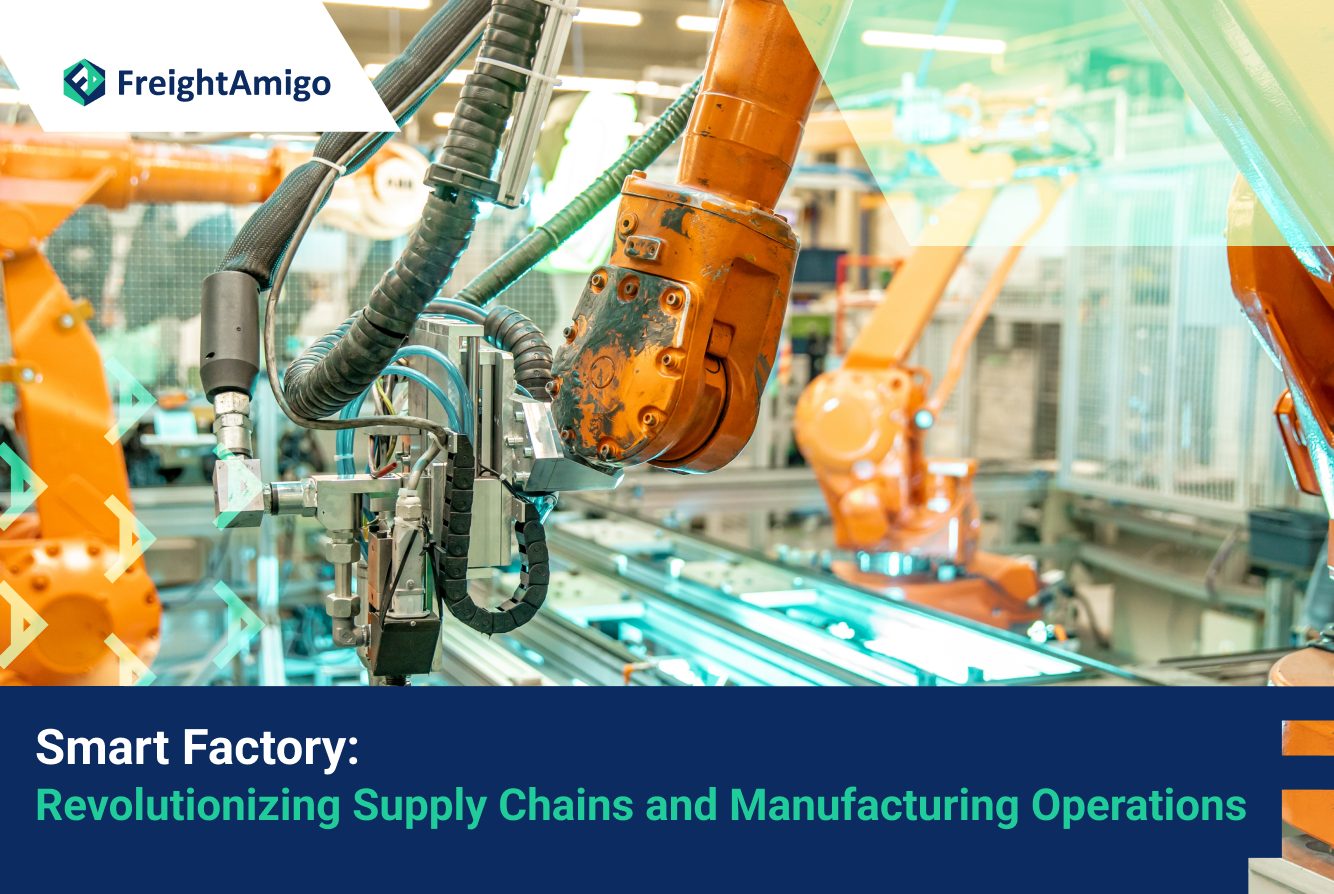The global business landscape is rapidly evolving, and in order to stay competitive and resilient in the 2020s, supply chains and manufacturing operations must undergo a digital transformation. The COVID-19 pandemic has further highlighted the weaknesses and vulnerabilities of traditional supply chains and manufacturing ecosystems, emphasizing the need for a more adaptable and agile solution that is fully digitally enabled.
Author Name:Tiffany Lee – Marketing Analyst at FreightAmigo
Want to compare the best Express, Air Freight, Sea Freight, Rail Freight & Trucking rates so as to have better control on cost?
What is Smart Factory?
A Smart Factory refers to an advanced manufacturing facility that embraces digitalization and connectivity to optimize operations and enhance efficiency. It involves the integration of various technologies, such as AI, Big Data Analytics, Cloud Computing, and Industrial IoT, to create a highly digitized and interconnected production environment. Through the seamless exchange of data between machines, devices, and systems, a Smart Factory enables real-time monitoring, analysis, and optimization of the entire manufacturing process. This connectivity and data-driven approach empower organizations to proactively address issues, improve processes, and adapt to changing demands, ultimately leading to increased productivity and agility.
The Role of FreightAmigo in Smart Factory Logistics
In the realm of smart factories, efficient supply chain management and customized logistics solutions are crucial for smooth material flow and component delivery. FreightAmigo, a leader in the field, offers a range of services that optimize transportation routes, provide reliable just-in-time delivery, and integrate and analyze data from the systems. Their collaborative partnership approach ensures seamless alignment between logistics and production objectives, enhancing production efficiency and cost-effectiveness.
Leveraging Smart Factory Technologies
Smart factory technologies encompass a wide range of innovations that leverage automation, data analytics, and connectivity to streamline operations and drive productivity. These technologies include:
-
Internet of Things (IoT)
The IoT enables machines, devices, and sensors to communicate and share data, creating a network of interconnected systems within the factory. This connectivity allows for real-time monitoring, predictive maintenance, and improved operational efficiency.
-
Artificial Intelligence (AI) and Machine Learning (ML)
AI and ML algorithms can analyze vast amounts of data to identify patterns, optimize processes, and make intelligent decisions. These technologies enable predictive maintenance, quality control, and demand forecasting, among other applications.
-
Robotics and Automation
Robots and automation systems play a significant role in smart factories, performing repetitive tasks with high precision and efficiency. They can handle complex assembly processes, material handling, and logistics, reducing human error and increasing productivity.
-
Additive Manufacturing
Also known as 3D printing, additive manufacturing allows for the production of complex and customized components on-demand. This technology eliminates the need for traditional manufacturing processes and reduces lead times, inventory costs, and transportation requirements.
Benefits of Smart Factories
The adoption of smart factory technologies brings numerous benefits to supply chains and manufacturing operations:
-
Enhanced Efficiency and Productivity
By automating processes and leveraging data analytics, smart factories optimize production workflows, reduce downtime, and improve overall efficiency. This leads to increased productivity and cost savings.
-
Improved Quality Control
Through real-time monitoring and data analysis, smart factories can identify quality issues at an early stage, enabling immediate corrective actions. This ensures that only products meeting the highest standards reach the market.
-
Agile Manufacturing
Smart factories enable agile manufacturing by quickly adapting to changing market demands and customer preferences. With real-time data and advanced analytics, manufacturers can adjust production schedules, optimize inventory levels, and respond rapidly to market fluctuations.
-
Supply Chain Visibility and Resilience
Digital technologies provide end-to-end visibility across the supply chain, allowing businesses to track inventory levels, monitor delivery status, and identify potential bottlenecks in real-time. This visibility enhances supply chain resilience, enabling proactive risk management and minimizing disruptions.
The Future of Smart Factories
The evolution of smart factories is an ongoing process, driven by advancements in technology and changing market dynamics. As technologies continue to mature and become more affordable, we can expect further adoption of smart factory solutions across industries. Key trends shaping the future of smart factories include:
-
5G Connectivity
The introduction of 5G networks will enable faster and more reliable connectivity, facilitating real-time data exchange and enabling more advanced applications in smart factories. This will further enhance productivity and enable new possibilities for automation and robotics.
-
Edge Computing
Edge computing brings data processing and analysis closer to the source, reducing latency and enabling faster decision-making. By processing data at the edge of the network, smart factories can achieve real-time responsiveness and minimize reliance on cloud-based solutions.
-
Digital Twins
Digital twins are virtual replicas of physical assets or processes, enabling real-time monitoring, simulation, and optimization. By creating digital twins of production lines or entire factories, manufacturers can test different scenarios, optimize processes, and identify potential issues before they occur.
-
Sustainability and Circular Economy
Smart factories will play a vital role in promoting sustainability and circular economy practices. By optimizing resource utilization, reducing waste, and enabling efficient recycling and remanufacturing processes, smart factories contribute to a more sustainable and environmentally friendly approach to manufacturing.
Conclusion
The digital transformation of supply chains and manufacturing operations through smart factory technologies is no longer a luxury but a necessity. The COVID-19 pandemic and changing consumer expectations have accelerated the urgency for change, highlighting the vulnerabilities of traditional supply chains. By embracing smart factory technologies, businesses can enhance efficiency, improve quality control, and achieve greater agility and resilience in their operations. With FreightAmigo’s expertise in supply chain management and customized logistics solutions, businesses can navigate the complexities of smart factory logistics and unlock the full potential of this transformative approach. Embrace the future of manufacturing with smart factories and maximize your competitive advantage.
There are different options for cargo transportation. If you want to choose the most convenient and suitable solution, it is best to have the full support of logistics experts! If you are planning to ship goods overseas, please go to the FreightAmigo page for inquiries.
===
If you have any inquiries on logistics/supply chain, feel free to contact FreightAmigo now:
Chat with us online OR
Phone : +852 28121686
WhatsApp: +852 27467829









































